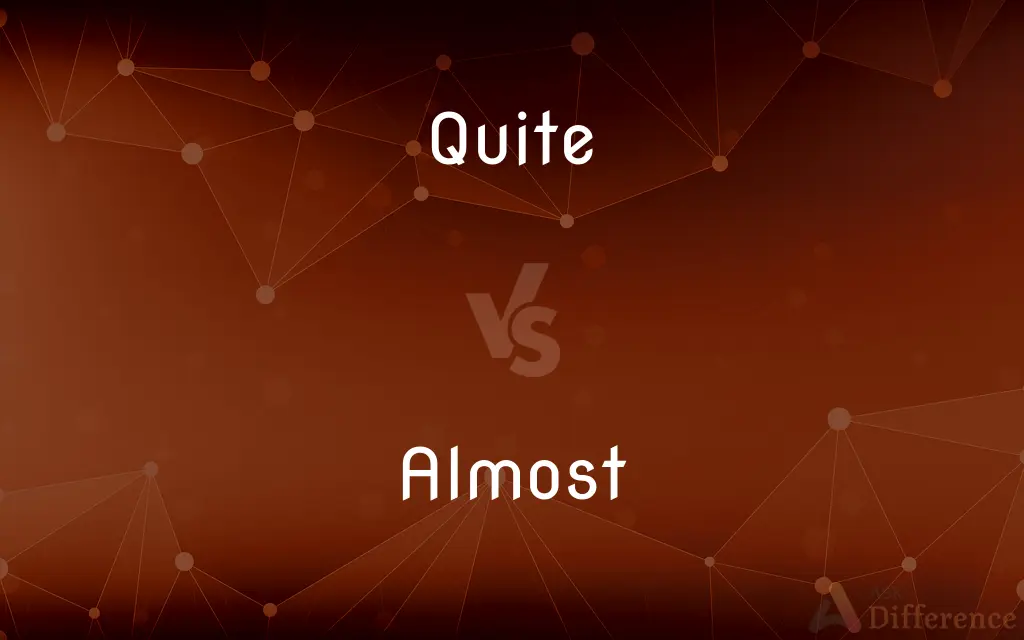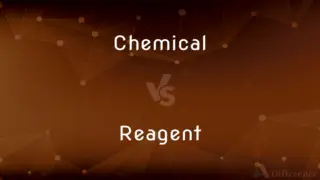Quite vs. Almost — What's the Difference?
Edited by Tayyaba Rehman — By Urooj Arif — Updated on April 26, 2024
"Quite" often implies a high degree, as in 'quite good' meaning very good, whereas "almost" suggests nearing completion or an end point, as in 'almost finished'.

Difference Between Quite and Almost
Table of Contents
ADVERTISEMENT
Key Differences
"Quite" can be used to enhance the degree of an adjective, adverb, or verb, suggesting completeness or a significant level, as in "quite beautiful" or "quite easily." Whereas "almost" typically refers to something that is nearly, but not completely, achieved or finished, like "almost done" or "almost all."
"Quite" can express a full or considerable degree of something, implying that it is more than average but not the utmost possible. For example, saying "quite interesting" suggests something is notably interesting. On the other hand, "almost" indicates a marginal deficiency from completeness or perfection, used in contexts like "almost perfect," where there is a tiny shortfall.
In British English, "quite" can mean somewhat or fairly, as in "quite nice," which may not imply very nice but rather moderately so. Whereas in American English, "quite" usually means very or to a great extent, thus making it stronger.
"Quite" also functions as an intensifier, where it strengthens the word it precedes. For instance, "quite amazing" emphasizes the extraordinary nature of something. However, "almost" serves as a qualifier, reducing certainty by indicating that the full extent or conclusion has not been reached, as in "almost certain."
While "quite" can sometimes be subjective, indicating varying levels of intensity depending on the context or speaker's perception, "almost" is more objective, generally used to denote a precise proximity to a goal or state that has not yet been fully realized.
ADVERTISEMENT
Comparison Chart
Definition
Denotes a high degree or completeness.
Indicates nearing completion but not complete.
Usage in Sentences
Used as an intensifier (e.g., quite interesting).
Used to show proximity to a state (e.g., almost done).
Implication
Implies more than average, less than maximum.
Suggests very close to a state or completion.
Subjectivity
Can be more subjective.
Generally more objective.
Variance by English
In British English, can mean "somewhat."
Consistent in meaning across English variants.
Compare with Definitions
Quite
Fairly; rather.
The movie was quite good.
Almost
Nearly; not quite.
He's almost finished with the project.
Quite
To a great extent.
She was quite pleased with the feedback.
Almost
Practically; very nearly.
It's almost impossible to find.
Quite
Absolutely; really.
It was quite a show.
Almost
On the verge of.
They are almost at the agreement stage.
Quite
Very; totally.
I'm quite sure you'll love it.
Almost
Slightly short of.
We're almost out of time.
Quite
Completely.
The results were quite surprising.
Almost
Just short of.
She was almost the winner.
Quite
To the utmost or most absolute extent or degree; absolutely; completely
I quite agree
Quite frankly, I don't blame you
Are you quite certain about this?
It's quite out of the question
This is quite a different problem
Almost
In set theory, when dealing with sets of infinite size, the term almost or nearly is used to refer to all but a negligible amount of elements in the set. The notion of "negligible" depends in the context, and may mean "of measure zero" (in a measure space), "countable" (when uncountably infinite sets are involved), or "finite" (when infinite sets are involved).For example: The set S = { n ∈ N | n ≥ k } {\displaystyle S=\{n\in \mathbb {N} \,|\,n\geq k\}} is almost N {\displaystyle \mathbb {N} } for any k {\displaystyle k} in N {\displaystyle \mathbb {N} } , because only finitely many natural numbers are less than k {\displaystyle k} .
Quite
To a certain or fairly significant extent or degree; fairly
He's quite an attractive man
It's quite warm outside
Almost
Not quite; very nearly
He almost knocked Georgina over
The place was almost empty
Blues, jazz—he can play almost anything
Quite
Expressing agreement with or understanding of a remark or statement
‘I don't want to talk about that now.’ ‘Quite’
Almost
Slightly short of; not quite; nearly
Almost time to go.
Was almost asleep.
Had almost finished. See Usage Note at none.
Quite
To the greatest extent; completely
Quite alone.
Not quite finished. See Usage Note at perfect.
Almost
Very close to, but not quite.
Quite
Actually; really
I'm quite positive about it.
Almost
(mathematics) Up to, except for a negligible set where negligible is not universally but contextually defined.
Almost all
Almost no
Quite
To a degree; rather
Quite soon.
Quite tasty.
Almost
A null set; except for a set of measure 0.
Almost everywhere
Almost nowhere
Almost certain
Almost sure
Quite
To the greatest extent or degree; completely, entirely.
Almost
(informal) Something or someone that doesn't quite make it.
In all the submissions, they found four papers that were clearly worth publishing and another dozen almosts.
Quite
With verbs, especially past participles.
Almost
Nearly; well nigh; all but; for the greatest part.
Almost thou persuadest me to be a Christian.
Quite
With prepositional phrases and spatial adverbs.
Almost
(of actions or states) slightly short of or not quite accomplished; `near' is sometimes used informally for `nearly' and `most' is sometimes used informally for `almost';
The job is (just) about done
The baby was almost asleep when the alarm sounded
We're almost finished
The car all but ran her down
He nearly fainted
Talked for nigh onto 2 hours
The recording is well-nigh perfect
Virtually all the parties signed the contract
I was near exhausted by the run
Most everyone agrees
Quite
With predicative adjectives.
Quite
With attributive adjectives, following an (especially indefinite) article; chiefly as expressing contrast, difference etc.
Quite
Preceding nouns introduced by the indefinite article. Chiefly in negative constructions.
Quite
With adverbs of manner.
Quite
In a fully justified sense; truly, perfectly, actually.
Quite
Coming before the indefinite article and an attributive adjective. (Now largely merged with moderative senses, below.)
Quite
With plain adjectives, past participles, and adverbs.
Quite
Coming before the definite article and an attributive superlative.
Quite
Before a noun preceded by an indefinite article; now often with ironic implications that the noun in question is particularly noteworthy or remarkable.
Quite
Before a noun preceded by the definite article.
Quite
With prepositional or adverbial phrases.
Quite
To a moderate extent or degree; somewhat, rather.
Mind your shoes, the basement is quite wet.
Quite
Indicates agreement; exactly so.
“That's a rather ugly colour for a house, don't you think?” — “Quite.”
Quite
(bullfighting) A series of passes made with the cape to distract the bull.
Quite
See Quit.
Quite
Completely; wholly; entirely; totally; perfectly; as, the work is not quite done; the object is quite accomplished; to be quite mistaken.
Man shall not quite be lost, but saved who will.
The same actions may be aimed at different ends, and arise from quite contrary principles.
Quite
To a great extent or degree; very; very much; considerably.
He really looks quite concerned.
The island stretches along the land and is quite close to it.
Quite
To a degree (not used with a negative);
Quite tasty
Quite soon
Quite ill
Quite rich
Quite
To the greatest extent; completely;
You're quite right
She was quite alone
Was quite mistaken
Quite the opposite
Not quite finished
Did not quite make it
Quite
Of an unusually noticeable or exceptional or remarkable kind (not used with a negative);
Her victory was quite something
She's quite a girl
Quite a film
Quite a walk
We've had quite an afternoon
Quite
Actually or truly or to an extreme;
Was quite a sudden change
It's quite the thing to do
Quite the rage
Quite so!
Common Curiosities
Can "quite" and "almost" be used interchangeably?
No, because "quite" intensifies while "almost" indicates something is nearing but hasn’t reached completion.
How is "almost" used differently from "quite"?
"Almost" implies a state of near completion or realization, unlike "quite," which intensifies or emphasizes a trait.
What does "quite" express in a sentence?
"Quite" expresses a significant degree or level of something, enhancing the adjective or adverb it modifies.
In which contexts is "quite" typically used?
"Quite" is used to modify adjectives, adverbs, and sometimes verbs to indicate a notable degree or extent.
What does "almost" indicate about the state of something?
It indicates that something is very close to being complete or occurring, but it is not fully there yet.
Which is more subjective, "quite" or "almost"?
"Quite" is more subjective as its intensity can vary based on perception and context.
Is "quite" always a positive enhancement?
Not necessarily; it depends on the context and the adjective it modifies. It can imply something is moderately or very much so.
How does the use of "almost" affect the expectation of an outcome?
It sets up an expectation that the final state or goal is imminent, but there’s still a slight gap.
Does "almost" have a different implication in negative contexts?
Yes, in negative contexts, "almost" can imply a narrow avoidance of something undesirable.
What are the key grammatical roles of "quite" and "almost"?
"Quite" acts as an adverb modifying adjectives, verbs, or other adverbs, while "almost" is an adverb that modifies verbs, adjectives, and other adverbs, pointing to nearness to completion.
Is "almost" commonly used in formal writing?
Yes, it's commonly used both in formal and informal contexts to indicate proximity to completion or fullness.
What is an example of "quite" in a sentence that shows its intensity?
"The exam was quite difficult," implying it was significantly difficult but not the hardest possible.
Why might someone choose to use "quite" over a simpler intensifier like "very"?
"Quite" can convey a nuanced degree of intensity, often sounding less extreme than "very."
Can "almost" suggest completeness in any scenario?
No, "almost" inherently suggests that something has not yet been completed or fully achieved.
How does the perception of "quite" differ between British and American English?
In British English, it can mean "somewhat" or "fairly," while in American English it typically means "very" or "completely."
Share Your Discovery

Previous Comparison
Confuse vs. Puzzle
Next Comparison
Chemical vs. ReagentAuthor Spotlight
Written by
Urooj ArifUrooj is a skilled content writer at Ask Difference, known for her exceptional ability to simplify complex topics into engaging and informative content. With a passion for research and a flair for clear, concise writing, she consistently delivers articles that resonate with our diverse audience.
Edited by
Tayyaba RehmanTayyaba Rehman is a distinguished writer, currently serving as a primary contributor to askdifference.com. As a researcher in semantics and etymology, Tayyaba's passion for the complexity of languages and their distinctions has found a perfect home on the platform. Tayyaba delves into the intricacies of language, distinguishing between commonly confused words and phrases, thereby providing clarity for readers worldwide.














































